Fall 2019 Newsletter
 Research Highlights
Research Highlights
Trainee Gardiner Furthers Development of New Passive Sampling Tool to Detect PFAS
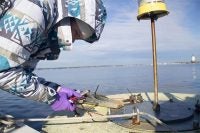
Two of the most common concerns about PFAS are its presence in drinking water and whether levels found in drinking water are safe for human consumption. To properly address these concerns, scientists need to collect water samples and analyze them in a lab, which can involve several days of preparation, careful adherence to protocols and is generally time and resource-intensive. As part of her MS research, STEEP trainee Christine Gardiner has helped develop new passive sampling tools that make PFAS detection easier and less costly. Read More…
Trainee Robuck Named 2019 Switzer Fellow
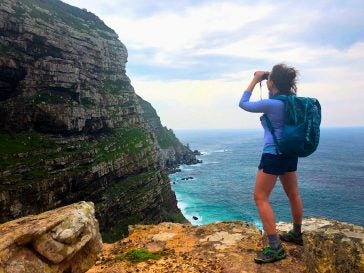 University of Rhode Island Superfund Research Program Trainee Anna Ruth Robuck was selected as one of 20 to join the ranks of 2019 Switzer Fellows. “The Network offers an amazing breadth of expertise and enthusiasm among its fellows past and present,” noted Robuck. “I am energized by the opportunity to learn from network members and to apply that knowledge towards environmental and public health concerns related to PFAS and other chemical contaminants.” Read More…
University of Rhode Island Superfund Research Program Trainee Anna Ruth Robuck was selected as one of 20 to join the ranks of 2019 Switzer Fellows. “The Network offers an amazing breadth of expertise and enthusiasm among its fellows past and present,” noted Robuck. “I am energized by the opportunity to learn from network members and to apply that knowledge towards environmental and public health concerns related to PFAS and other chemical contaminants.” Read More…
Trainee Alesio Presents PFAS-Protein Binding Research at SRP National Meeting
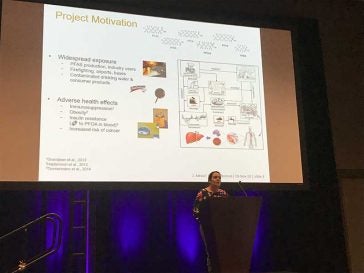
STEEP trainee Jessica Alesio presented a talk titled “PFAS-Protein Binding by Fluorescence Spectroscopy: A Critical Analysis” at this year’s National Meeting of the NIEHS Superfund Research Program. Her presentation highlighted research underway at URI to further understand the importance of PFAS-protein binding and techniques appropriate to measuring binding. Read More…
 Events
Events
SETAC Conference Session Focuses on Ubiquity of PFAS in Daily Life
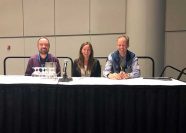 STEEP researchers organized a session at SETAC, The Society of Environmental Toxicology and Chemistry, whose global meetings offer a forum for environmental professionals and institutions engaged in the study of environmental problems, management and regulation of natural resources, environmental education, and research and development. In November 2019, researchers convened from around the globe to talk about the occurrence of PFAS in the environment and living creatures, and the methods researchers use to gain this information. Read More…
STEEP researchers organized a session at SETAC, The Society of Environmental Toxicology and Chemistry, whose global meetings offer a forum for environmental professionals and institutions engaged in the study of environmental problems, management and regulation of natural resources, environmental education, and research and development. In November 2019, researchers convened from around the globe to talk about the occurrence of PFAS in the environment and living creatures, and the methods researchers use to gain this information. Read More…
National Academy of Sciences Environmental Health Initiative
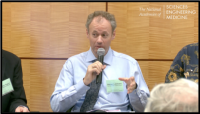 In another clear sign that PFAS contamination is emerging as an important, albeit contentious issue at the national level, the National Academies of Sciences, Engineering, and Medicine recently hosted its first workshop devoted entirely to the topic. The disparate perspectives surrounding PFAS were evident as workshop attendees were directed to lay out diverging opinions on how to proceed in lieu of developing a consensus document. Read More…
In another clear sign that PFAS contamination is emerging as an important, albeit contentious issue at the national level, the National Academies of Sciences, Engineering, and Medicine recently hosted its first workshop devoted entirely to the topic. The disparate perspectives surrounding PFAS were evident as workshop attendees were directed to lay out diverging opinions on how to proceed in lieu of developing a consensus document. Read More…
 Program Updates
Program Updates
Training Core Colloquium Broadens Next Generation Scientists’ Awareness of PFAS Impacts
 STEEP’s Training Core is comprised of doctoral and master’s students who are required to complete two semester-long colloquia during their first two years. Each STEEP Colloquium provides trainees with a unique learning experience covering all aspects of PFAS, ranging from physicochemical properties, detection, remediation, and toxicology, to community engagement and translational science communication techniques to inform affected communities, all the while exploring issues of social and environmental justice policy. Read More…
STEEP’s Training Core is comprised of doctoral and master’s students who are required to complete two semester-long colloquia during their first two years. Each STEEP Colloquium provides trainees with a unique learning experience covering all aspects of PFAS, ranging from physicochemical properties, detection, remediation, and toxicology, to community engagement and translational science communication techniques to inform affected communities, all the while exploring issues of social and environmental justice policy. Read More…
STEEP Research Translation Core Launches Short Video Series
 “Silent Chemicals, Loud Science,” featuring STEEP scientists whose conversations explain PFAS, explore their potential impacts, offer first steps for homefront protection, and a hopeful vision that there is a real opportunity to reduce the presence of “forever chemicals” in our lives. Read More…
“Silent Chemicals, Loud Science,” featuring STEEP scientists whose conversations explain PFAS, explore their potential impacts, offer first steps for homefront protection, and a hopeful vision that there is a real opportunity to reduce the presence of “forever chemicals” in our lives. Read More…
Researcher Dr. Pál Weihe Recipient of Prestigious International Award
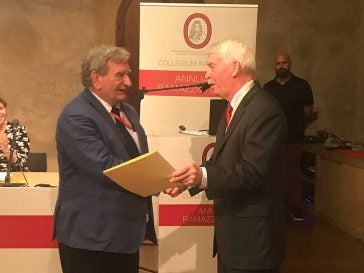 The Collegium Ramazzini honored Dr. Pál Weihe as the 2019 recipient of the Ramazzini Special Award. Dr. Weihe has dedicated his life to protecting the citizens of the Faroe Islands, a STEEP research site, and the circumpolar region against environmental threats to health. Through his work, he has made fundamental contributions to understanding the interconnections between human well-being and the health of the earth’s oceans. Read More…
The Collegium Ramazzini honored Dr. Pál Weihe as the 2019 recipient of the Ramazzini Special Award. Dr. Weihe has dedicated his life to protecting the citizens of the Faroe Islands, a STEEP research site, and the circumpolar region against environmental threats to health. Through his work, he has made fundamental contributions to understanding the interconnections between human well-being and the health of the earth’s oceans. Read More…
 Community News
Community News
STEEP Science Day Engages Cape Cod Community in Lively Exchange
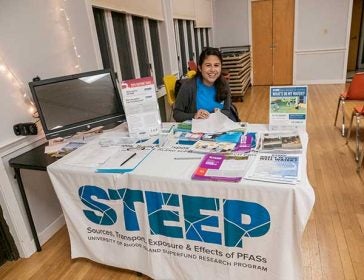 Cape Cod residents joined with STEEP researchers to learn more about PFAS concentrations in private well water sources across the Cape. Scientists and residents exchanged information, concerns, and ideas regarding the presence of PFAS in their community. Read More…
Cape Cod residents joined with STEEP researchers to learn more about PFAS concentrations in private well water sources across the Cape. Scientists and residents exchanged information, concerns, and ideas regarding the presence of PFAS in their community. Read More…
Read the 2025 Issue 1 Newsletter
Read the 2024 Issue 2 Newsletter
Read the 2024 Issue 1 Newsletter
Read the Spring/Summer 2023 Newsletter
Read the Winter 2023 Newsletter
Read the Winter 2022 Newsletter
Read the Spring 2021 Newsletter

